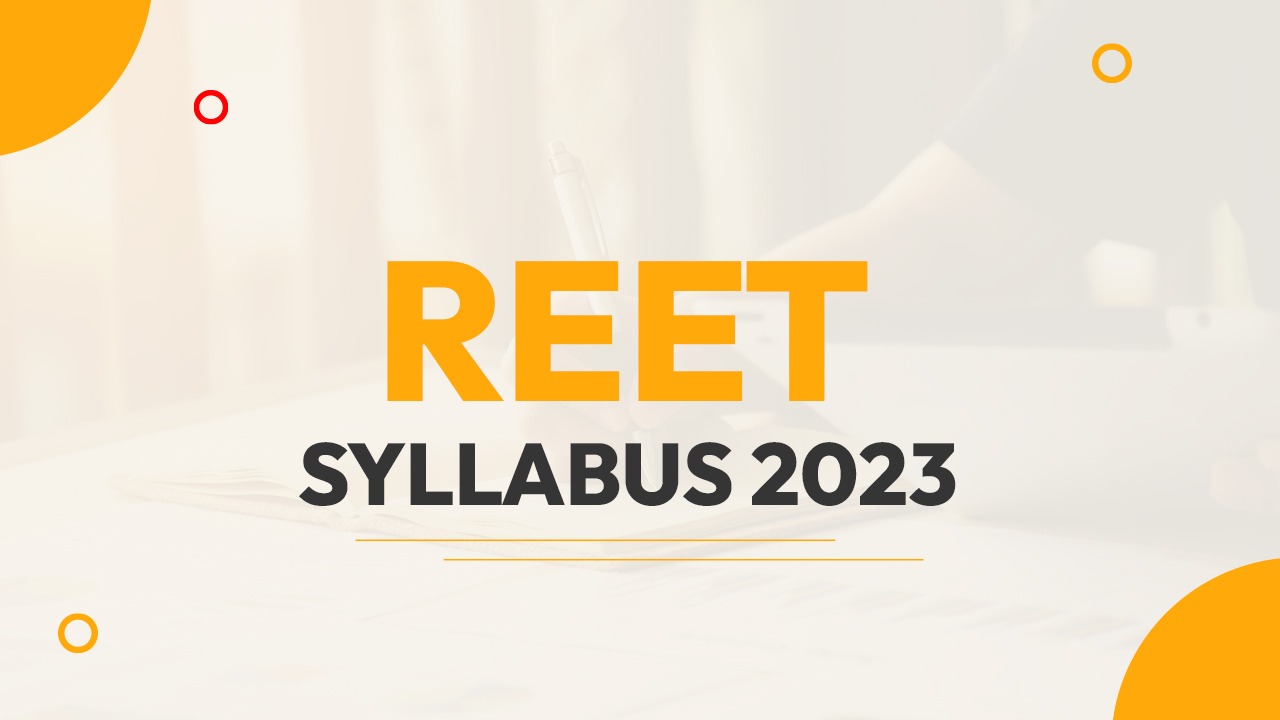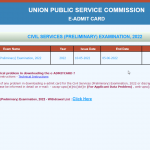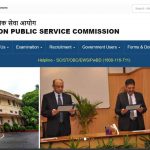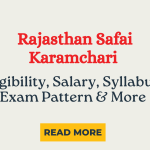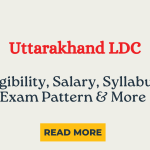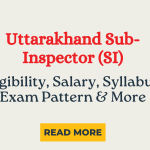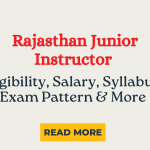Rajasthan Eligibility Examination for Teachers (REET) is a state-level examination conducted by the Rajasthan Board of Secondary Education RBSE to recruit primary and upper primary school teachers. Candidates who clear the written test will be called for the interviewing process. This article will explain the updated syllabus and exam pattern for REET Level 1, Level 2, and Grade 3 exams.
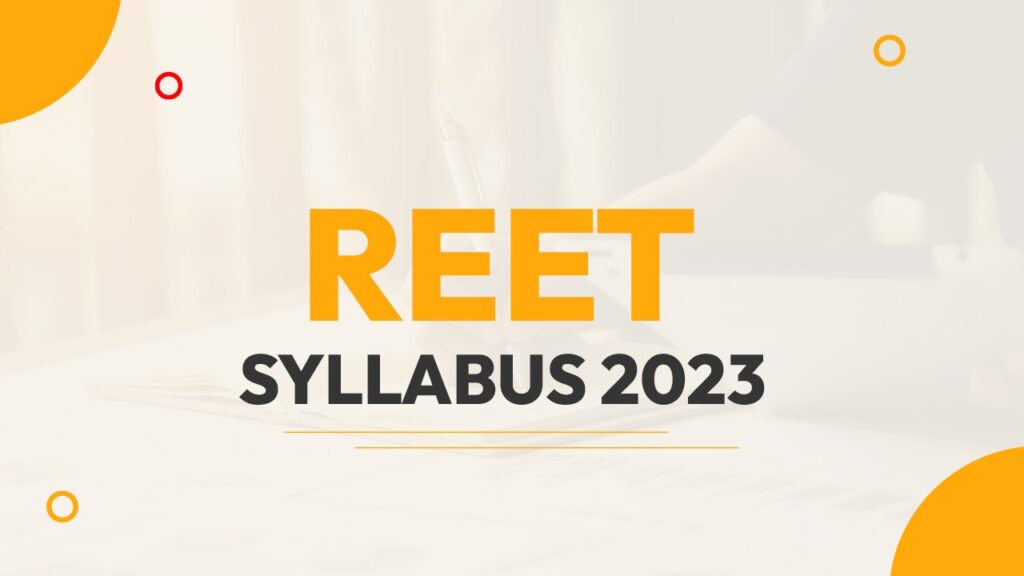
The REET exam is held at the state level for Level 1 and Level 2 papers. Level 1 is for primary school teachers who want to teach grades one through five, whereas Level 2 is for upper primary school teachers who want to teach grades six through eight. Those who wish to teach in grades 1 through 8 must take both level exams. To be eligible to teach classes 1 to 8 in Rajasthan schools, candidates must have passed the REET 2023 test. Moreover, we all know that preparing for the competitive exams and the REET previous year’s question papers is important in the preparation journey.
REET Exam 2023 Overview:
As announced by Rajasthan Chief Minister, REET 2023 will be held from February 25 to 28, 2023. The important points for REET recruitment 2023 are given in the table below.
| Events | Details |
|---|---|
| Exam Name | Rajasthan Eligibility Examination for Teacher |
| Conducting Body | Board of Secondary Education, Rajasthan (RBSE) |
| Exam Level | State Level |
| Exam Mode | Offline |
| Language | English and Hindi |
| Starting of the Application Process | December 21, 2022 |
| Last Date to Apply | January 19, 2023 |
| Release of Admit card | To Be Announced |
| REET Mains 2023 Exam Date | February 25-28, 2023 |
| Duration of Exam | 2 hours and 30 minutes |
| Papers | Level 1 paper & Level 2 Paper |
| Declaration of Revised Result (2021) | December 06, 2021 |
| Official Website | rajeduboard.rajasthan.gov.in |
Apply for REET Mains Exam 2023.
The application form for the REET mains exam was released on December 21st, 2022. Candidates can apply for the REET Mains Exam from December 21st, 2022, to January 19th, 2023, through the board’s official website. Aspirants who qualified in the Prelims exam are eligible to apply for the mains exam.
REET Exam Pattern 2023
Candidates can apply for the Paper 1 or 2 exam as per eligibility and interest. S/he will be eligible for the Grade 3 exam after successfully qualifying for any of these two or both exams. Candidates have to qualify the REET exam only once in their lifetime. After this, S/he can directly apply for the Grade 3 Exam.
Paper-I (for classes I to V)
| Subjects | No. of Questions | Marks |
|---|---|---|
| Child Development and Pedagogy | 30 | 30 |
| Language I (compulsory) | 30 | 30 |
| Language II (compulsory) | 30 | 30 |
| Mathematics | 30 | 30 |
| Environmental Studies | 30 | 30 |
| Total | 150 | 150 |
Paper-II (for Classes VI to VIII) Elementary Stage
| Subjects | No. of Questions | Marks |
|---|---|---|
| Child Development and Pedagogy | 30 | 30 |
| Language I (compulsory) | 30 | 30 |
| Language I (compulsory) | 30 | 30 |
| Mathematics & Science Or Social Studies/Social Science Or Any Other Subject | 30 | 30 |
| Total | 150 | 150 |
REET Level 1 and Level 2 Exam Syllabus 2023
Every candidate aspires to achieve the highest possible score, but it is essential to know the complete syllabus thoroughly. The REET syllabus is split into two levels as well. Candidates should start studying for the REET exam by completing the entire REET syllabus, which is as follows:
Level 1 Syllabus (for Class I to V) REET Exam 2023
Child Development & Pedagogy
- Child Development – Concept of growth and development, Principles and dimensions of development. Factors affecting development (especially in the context of family and school) and its relationship with learning.
- Role of Heredity and environment
- Meaning and Concept of learning and its processes. Factors Affecting learning
- Theories of learning and its implication
- How Children learn and think.
- Motivation and Implications for Learning.
- Individual Differences – Meaning, types, and Factors Affecting Individual differences.
- Understanding individual differences on the basis of language, gender, community, caste & religion.
- Personality – Concept and types of personality, Factors responsible for shaping it. Its measurement.
- Intelligence – Concept, Theories and its measurement. Multidimensional Intelligence. Its implication.
- Understanding diverse learners – Backward, Mentally retarded, gifted, creative, disadvantaged and deprived, specially-abled.
- Learning Difficulties.
- Adjustment – Concept and ways of adjustment. Role of teacher in the adjustment.
- The teaching-learning process, teaching strategies, and methods in the context of the National.
- Curriculum Framework 2005.
- Meaning and purposes of Assessment, Measurement, and Evaluation. Comprehensive and Continuous Evaluation. Construction of Achievement Test.
- Action Research.
- Right to Education Act 2009 (Role and Responsibilities of Teachers).
REET 2023 Syllabus For Mathematics
- Whole numbers up to one crore, Place Value, Comparison; Fundamental mathematical operations: Addition, Subtraction, Multiplication, and Division; Indian Currency.
- Concept of fractions, proper fractions, comparison of proper fractions of the same denominator, mixed fractions, comparison of proper fractions of unequal denominators, and Addition and Subtraction of fractions. Prime and composite numbers, Prime factors, Lowest Common, Multiple (LCM), and Highest Common Factor (HCF).
- Unitary law, Average, Profit – Loss, simple interest.
- Plane and curved surfaces, plane and solid geometrical figures, properties of plane geometrical figures; point, line, ray, line segment; Angle and their types.
- Length, Weight, Capacity, Time, Measurement of area and their standard units and relation between them; Area and perimeter of plane surfaces of square and rectangular objects.
- Nature of Mathematics/Logical thinking
- Place of Mathematics in Curriculum.
- Language of Mathematics.
- Community Mathematics.
- Evaluation through formal and informal methods.
- Problems of Teaching.
- Error analysis and related aspects of learning and teaching.
- Diagnostic and Remedial Teaching.
Language 1
💡 Choose any one language from Hindi, English, Punjabi, Urdu, Sanskrit, Sindhi, and Gujarati. We are displaying the syllabus only in Hindi and English.
(A) Hindi Language:
| 1. | एक अपठित गद्यांश में से निम्नलिखित व्याकरण संबंधी प्रश्न :- पर्यायवाची, विलोम, एकार्थी शब्द ,शब्दार्थ, शब्द शुधि। उपसर्ग, प्रत्यय, संधि और समास। संज्ञा, सर्वनाम, विशेषण, अव्यय। |
| 2. | एक अपठित गद्यांश में से निम्नलिखित बिंदुओं पर प्रश्न :- रेखांकित शब्दों का अर्थ स्पष्ट करना, वचन, काल, लिंग ज्ञात करना। दिए गए शब्दों का वचन काल और लिंग बदलना। |
| 3. | वाक्य रचना, वाक्य के अंग, वाक्य के प्रकार, पदबंध, मुहावरे और लोकोक्तियाँ , विराम चिन्ह। |
| 4. | भाषा की शिक्षण विधि, भाषा शिक्षण के उपागम, भाषा दक्षता का विकास। |
| 5. | भाषायी कौशलों का विकास (सुनना, बोलना, पढ़ना, लिखना) हिंदी भाषा शिक्षण में चुनौतियाँ, शिक्षण अधिगम सामग्री, पाठ्य पुस्तक, बहु-माध्यम एवं शिक्षण के अन्य संसाधन। |
| 6. | भाषा शिक्षण में मूल्यांकन, उपलब्धि परीक्षण का निर्माण समग्र एवं सतत् मूल्यांकन, उपचारात्मक शिक्षण। |
(B) English Language:
| 1. | Unseen Prose Passage: Synonyms, Antonyms, Spellings, Word-formation, One Word Substitution |
| 2. | Unseen Prose Passage: Parts of Speech, Tenses, Determiners, Degrees of Comparison |
| 3. | Framing Questions Including Wh – questions, Active and Passive Voice, Narration, Knowledge of English Sounds and Phonetic Symbols |
| 4. | Principles of Teaching English, Methods, and Approaches to English Language Teaching |
| 5. | Development of Language Skills, Teaching Learning Materials: Textbooks, Multi-Media Materials, and Other Resources |
| 6. | Comprehensive & Continuous Evaluation, Evaluation in the English Language |
Language 2
Choose a language from Hindi, English, Punjabi, Urdu, Sanskrit, Sindhi, and Gujarati. 💡 This must be different from Language 1. We are displaying the syllabus only in Hindi and English.
(A) Hindi Language:
| 1. | एक अपठित गद्यांश आधारित निम्नलिखित व्याकरण संबंधी प्रश्न :युग्म शब्द, वाक्यांश के लिए एक शब्द, शब्द शुधि, उपसर्ग, प्रत्यय, संधि, समास, संज्ञा, सर्वनाम, विशेषण, क्रिया, लिंग, वचन, काल । |
| 2. | एक अपठित पद्यांश पर आधारित निम्नलिखित बिंदुओं पर प्रश्न : |
| 3. | भाव सौंदर्य |
| 4. | विचार सौंदर्य |
| 5. | नाद सौंदर्य |
| 6. | शिल्प सौंदर्य |
| 7. | जीवन दृष्टि |
| 8. | वाक्य रचना, वाक्य के अंग, वाक्य के भेद, पदबंध, मुहावरे, लोकोक्तियाँ। कारक चिहन, अव्यय, विराम चिन्ह। |
| 9. | भाषा शिक्षण विधि, भाषा शिक्षण के उपागम, भाषायी दक्षता का विकास। |
| 10. | भाषायी कौशलों का विकास (सुनना, बोलना, पढ़ना, लिखना) शिक्षण अधिगम सामग्री-पाठ्य पुस्तक, बहु-माध्यम एवं शिक्षण के अन्य संसाधन। |
| 11. | भाषा शिक्षण में मूल्यांकन, (सुनना, बोलना, पढ़ना, लिखना) उपलब्धि परीक्षण का निर्माण समग्र एवं सतत् मूल्यांकन। उपचारात्मक शिक्षण। |
(B) English Language :
| 1. | Unseen Prose Passage: Linking Devices, Subject-Verb Concord, Inferences |
| 2. | Unseen Poem: Identification of Alliteration, Simile, Metaphor Personification, Assonance, Rhyme |
| 3. | Modal Auxiliaries, Common Idioms, and Phrases, Literary Terms: Elegy, Sonnet, Short Story, Drama |
| 4. | Basic knowledge of English Sounds and symbols |
| 5. | Principles of Teaching English, Communicative Approach to English Language Teaching, Challenges of Teaching English: Language Difficulties, Role of home language, multilingualism |
| 6. | Methods of Evaluation, Remedial Teaching |
Environmental Studies Syllabus
- Family – Personal relationships, nuclear and joint families; social abuses (child marriage, dowry system, child labour, theft); addiction (intoxication, smoking) and its personal, social, and economic bad effects.
- Clothes and Habitats – Clothes for different seasons; maintenance of clothes at home; handloom.
- power loom; habitats of living beings, various types of houses; cleanliness of houses and neighbouring areas,
- Different types of materials for building houses.
- Profession – Profession of your surroundings (stitching clothes, gardening, farming, animal rearing, vegetable vendor, etc.), small and cottage industries; major industries of Rajasthan State, Need for the consumer.
- Protection, cooperative societies.
- Public places and Institutions – Public places like schools, hospitals, post offices, bus stands, and railway stations.
- Public property (street lights, roads, buses, trains, public buildings, etc.); wastage of electricity and water.
- employment policies; general information about Panchayat, legislative assembly, and parliament.
- Our Culture and Civilization – Fairs and festivals, National festivals; Dresses, food habits and art and craft of Rajasthan; Tourist places of Rajasthan; Great personalities of Rajasthan.
- Transport and Communication – Means of transportation and communication; Rules for pedestrians and transport; Effects of means of communication on the lifestyle.
- Personal Hygiene – External parts of our body and their cleanliness; general information about the internal parts of the body; Balance diet and its importance; Common diseases (gastroenteritis, amoebiosis, methemoglobin, anaemia, fluorosis, malaria, dengue.) and their causes and methods of prevention; Pulse Polio campaign.
- Living Beings- Levels of organization of plants and animals, diversity of living organisms, state flower, state tree, state bird, state animal; knowledge of reserve forest and wildlife (national parks, sanctuaries, tiger reserve, world heritage), conservation of species of plants and animals, knowledge of Kharif and Rabi crops.
- Matter and Energy – Common properties of substances (colour, state, ductility, solubility), various types of fuels; types of energy and transformation of one form into another; Applications of energy in daily life, sources of light, common properties of light.
- Basic knowledge of air, water, forest, wetlands, and deserts; different kinds of pollution; renewable and nonrenewable energy resources in Rajasthan; the concept of their conservation; weather and climate; and the water cycle.
- Concept and scope of Environment Studies.
- Significance of Environment Studies, Integrated Environment Studies.
- Environmental Studies & Environmental Education learning Principles.
- Scope & relation to Science & Social Science.
- Approaches of presenting concepts.
- Activities.
- Experimentation/Practical Work.
- Discussion.
- Comprehensive and Continuous Evaluation.
- Teaching material/Aids.
- Problems of Teaching.
REET Level 2 Syllabus (for Class VI to VIII)
Child Development & Pedagogy
- Child Development – Concept of growth and development, Principles and dimensions of development. Factors affecting development (especially in the context of family and school) and its relationship with learning.
- Role of Heredity and environment
- Meaning and Concept of learning and its processes. Factors Affecting learning
- Theories of learning and its implication
- How Children learn and think.
- Motivation and Implications for Learning.
- Individual Differences – Meaning, types, and Factors Affecting Individual differences.
- Understanding individual differences based on language, gender, community, caste & religion.
- Personality – Concept and types of personality, Factors responsible for shaping it. Its measurement.
- Intelligence – Concept, Theories and its measurement. Multidimensional Intelligence. Its implication.
- Understanding diverse learners – Backward, Mentally retarded, gifted, creative, disadvantaged and deprived, specially-abled.
- Learning Difficulties.
- Adjustment – Concept and ways of adjustment. Role of teacher in the adjustment.
- The teaching-learning process, teaching strategies, and methods in the context of the National.
- Curriculum Framework 2005.
- Meaning and purposes of Assessment, Measurement, and Evaluation. Comprehensive and Continuous Evaluation. Construction of Achievement Test.
- Action Research.
- Right to Education Act 2009 (Role and Responsibilities of Teachers).
Language 1
💡 Choose any one language from Hindi, English, Punjabi, Urdu, Sanskrit, Sindhi, and Gujarati. We are displaying the syllabus only of Hindi and English.
(A) Hindi Language
| 1. | एक अपठित गद्यांश में से निम्नलिखित व्याकरण संबंधी प्रश्न :- शब्द ज्ञान, तत्सम, तद्भव, देशज, विदेशी शब्द । पर्यायवाची, विलोम, एकार्थी शब्द । उपसर्ग, प्रत्यय, संधि और समास । संज्ञा, सर्वनाम, विशेषण, अव्यय ,वाक्यांश के लिए एक शब्द, शब्द शुधि। |
| 2. | एक अपठित गद्यांश में से निम्नलिखित बिंदुओं पर प्रश्न :- रेखांकित शब्दों का अर्थ स्पष्ट करना, वचन, काल, लिंग ज्ञात करना। दिए गए शब्दों का वचन काल और लिंग बदलना।राजस्थानी शब्दों के हिंदी रूप |
| 3. | वाक्य रचना, वाक्य के अंग, वाक्य के प्रकार, पदबंध, मुहावरे और लोकोक्तियाँ,विराम चिन्ह। |
| 4. | भाषा की शिक्षण विधि, भाषा शिक्षण के उपागम, भाषा दक्षता का विकास। |
| 5. | भाषायी कौशलों का विकास (सुनना, बोलना, पढ़ना, लिखना) हिंदी भाषा शिक्षण में चुनौतियाँ, शिक्षण अधिगम सामग्री, पाठ्य पुस्तक, बहु-माध्यम एवं शिक्षण के अन्य संसाधन। |
| 6. | भाषा शिक्षण में मूल्यांकन, उपलब्धि परीक्षण का निर्माण समग्र एवं सतत् मूल्यांकन, उपचारात्मक शिक्षण। |
(B) English Language
| 1. | Unseen Prose Passage Synonyms, Antonyms, Spellings, Word-formation, One Word Substitution |
| 2. | Unseen Prose Passage Parts of Speech, Tenses, Determiners, Change of Degrees |
| 3. | Framing Questions, Including Wh-questions, Active and Passive Voice, Narration, Knowledge of English Sounds, and Phonetic Symbols |
| 4. | Principles of Teaching English, Methods, and Approaches to English Language Teaching |
| 5. | Development of Language Skills, Teaching Learning Materials: Textbooks, Multi-media Materials, and other resources |
| 6. | Continuous and Comprehensive Evaluation, Assessment, and Evaluation in Language. |
Language 2
Choose any one language from Hindi, English, Punjabi, Urdu, Sanskrit, Sindhi, and Gujarati. 💡 This must be different from Language 1. We are displaying the syllabus only in Hindi and English.
(A) Hindi Language
| 1. | एक अपठित गद्यांश आधारित निम्नलिखित व्याकरण संबंधी प्रश्न :- वर्ण विचार, वर्ण विश्लेषण, शब्द ज्ञान, तत्सम, तद्भव, देशज, विदेशी शब्द । युग्म शब्द,उपसर्ग, प्रत्यय, संधि, समास, शब्दों को शब्द कोष क्रम में लिखना, शब्दों के मानक रूप में लिखना, संज्ञा, सर्वनाम, विशेषण, क्रिया, क्रिया विशेषण, लिंग, वचन, काल । |
| 2. | एक अपठित पद्यांश पर आधारित निम्नलिखित बिंदुओं पर प्रश्न भाव सौंदर्य, विचार सौंदर्य, नाद सौंदर्य, शिल्प सौंदर्य, जीवन दृष्टि |
| 3. | वाक्य रचना, वाक्य के अंग, वाक्य के भेद, पदबंध, मुहावरे, लोकोक्तियाँ। कारक चिह्न, अव्यय, राजस्थानी मुहावरों का अर्थ व प्रयोग , विराम चिन्ह |
| 4. | भाषा शिक्षण विधि, भाषा शिक्षण के उपागम, भाषायी दक्षता का विकास । |
| 5. | भाषायी कौशलों का विकास (सुनना, बोलना, पढ़ना, लिखना) शिक्षण अधिगम सामग्री-पाठ्य पुस्तक, बहु-माध्यम एवं शिक्षण के अन्य संसाधन। |
| 6. | भाषा शिक्षण में मूल्यांकन, (सुनना, बोलना, पढ़ना, लिखना) उपलब्धि परीक्षण का निर्माण, समग्र एवं सतत् मूल्यांकन, उपचारात्मक शिक्षण। |
English Langauge (L2)
| 1. | Unseen Prose Passage: Linking Devices, Subject-Verb Concord, Inferences |
| 2. | Unseen Poem: Identification of Alliteration, Simile, Metaphor Personification, Assonance, Rhyme |
| 3. | Modal Auxiliaries, Common Idioms, and Phrases, Literary Terms: Elegy, Sonnet, Short Story, Drama |
| 4. | Basic knowledge of English Sounds and their Phonetic Transcription |
| 5. | Principles of Teaching English, Communicative Approach to English Language Teaching, Challenges of Teaching English: Language Difficulties( role of home language multilingualism) |
| 6. | Methods of Evaluation, Remedial Teaching |
Mathematics and Science
- Indices – Multiplication and division of numbers on equal bases, Laws of Indices.
- Algebraic expressions – Addition, Subtraction, Multiplication and Division, Identities.
- Factors – factors of simple algebraic expressions
- Equations – Simple linear equation.
- Square & Square Root.
- Cube & Cube Root
- Interest – Simple interest, Compound interest, Profit – Loss.
- Ratio and Proportion – Division into proportional parts, Partnership.
- Percentage, Birth and Death rate, Population growth, Depreciation,
- Lines and Angles – Line segment, straight and curved lines, types of angles.
- Plane figures – Triangles, Congruence of Triangles, Quadrilaterals, and Circle.
- Area of Plane figures – Triangles, Rectangles, Parallelograms, and Trapeziums.
- Surface Area and Volume – cube, cuboid, and right circular cylinder.
- Statistics – data collection and classification, frequency distribution table, Tally marks, bar graph and histogram, circular graph (Pai diagram).
- Graph – Various types of graphs.
- Nature of Mathematics/Logical thinking
- Place of Mathematics in Curriculum
- Language of Mathematics
- Evaluation
- Remedial Teaching
- Problems of Teaching
Social Studies Syllabus
- Mauryan & Gupta Empires and Post-Gupta Period – Political history & administration, contribution to Indian culture, Cultural achievement of Gupta’s age, India (600-1000 AD) Indian cultural contacts with the outside world.
- Indian Civilization, Culture, and Society –Indus valley civilization, Vedic culture, Indian Society: Characteristics, Family, Marriage, Gender Sensitization, Rural Life and Urbanization.
- Medieval and Modern Period –The Bhakti and Sufi Movement, Mughal-Rajput relations; Mughal administration, social, economic and cultural conditions during the Medieval period, British policies towards Indian states, Revolt of 1857; Impacts of British Rule on Indian Economy, Renaissance and Social reforms, Indian National Movement (1919-1947)
- Indian Constitution and Democracy – Preamble, Fundamental Rights and Fundamental Duties, Secularism, and Social justice.
- Government: Composition and Functions –Parliament, President, Prime minister and Council of Ministers; State Government; Panchayati raj and Urban Self-Government.
- Main Components of the Earth – lithosphere, hydrosphere, atmosphere, biosphere; types of rocks; Interior and Exterior forces modifying earth’s surface.
- Resources and Development – Types of Resources, Conservation of Resources, Soils, Minerals, and Power Resources, Agriculture, Industries, and Human Resources.
- Geography and Resources of India –Physiographic regions, Climate, Natural vegetation, Wild Life, Multipurpose projects, Agriculture crops, Industries, Transportation, Population, Public amenities, Economic and Social Programmes of Development, and Consumer awareness.
- Geography and Resources of Rajasthan – Physical regions, Water conservation and Harvesting, Agriculture Crops, Minerals, Energy Resources, Transport, Industries, Population.
- History and Culture of Rajasthan – Ancient Civilizations and Janpadas, Freedom Struggle in Rajasthan; Integration of Rajasthan; Heritage and Culture of Rajasthan (Forts, Palaces, Fairs, Festivals, Folk-arts, Handicrafts), Rajasthani Literature, Tourism, Conservation of Heritage.
- Pedagogical Issues – I – Concept & Nature of Social Science/Social Studies; Class Room Processes, activities and discourse; Problems of teaching Social Science/Social Studies; Developing critical thinking.
- Pedagogical Issues – II – Enquiry/Empirical Evidence; Teaching Learning Material and Teaching Aids; Projects Work; Evaluation.
Candidates who qualified the Paper 1, Paper 2 or both will be eligible for the REET Grade 3 Exam.
REET New Syllabus 2023 for Grade 3 Teachers Exam:
Candidates must attentively study and understand the updated REET Exam Pattern 2023 for the Grade 3 Teachers Exam. Candidates for the Grade 3 Teacher Exam will have to take a separate entrance exam. As a result, candidates must prepare for the Grade 3 Teacher Exam using the new REET syllabus and exam pattern 2023, which may be seen below.
| Total Marks | 300 Marks |
| Total Number of Questions | 150 Marks |
| Marking Scheme | 2 marks will be awarded for each correct answer 1/3 marks will be deducted for each incorrect answer |
| Negative Marking | Yes |
| Duration of Exam | 2 hours and 30 minutes |
| Papers | Paper-I Paper-II |
Grade 3 Recruitment Level-I Exam Pattern & Marks Distribution 2023 (NEW)
A new marking allocation pattern will be used in REET Level-I. There will be 150 questions totalling 300 marks. For each incorrect answer, a 1/3 mark deduction will be applied. The subject level for REET Level-I will be secondary, and the difficulty level will be higher secondary.
Level I: REET Exam Pattern
| Section | Marks | Total Marks | |
| Geographical, Historical and Cultural Knowledge of Rajasthan | 90 | ||
| General Knowledge of Rajasthan, Educational Scenario, Act of Free and Compulsory Child Education and Current Affairs | 90 | ||
| School Subject | Hindi | 10 | 50 |
| Math | 10 | ||
| English | 10 | ||
| General Science | 10 | ||
| Social Studies | 10 | ||
| Pedagogy | Hindi | 8 | 40 |
| Math | 8 | ||
| English | 8 | ||
| General Science | 8 | ||
| Social Studies | 8 | ||
| Educational Pedagogy | 20 | 20 | |
| Information Technology | 10 | 10 | |
| Total | 300 | ||
Level II: REET Exam Pattern
| Section | No. Of Questions |
|---|---|
| Geographical, Historical, and Cultural Knowledge of Rajasthan | 70 |
| General Knowledge of Rajasthan, Educational Scenario, Act of Free and Compulsory Child Education, and Current Affairs | 60 |
| Knowledge of the concerned school subject | 120 |
| Pedagogy | 20 |
| Educational Pedagogy | 20 |
| Information Technology | 10 |
| Total | 300 |
After learning about the syllabus, most students prefer to take coaching classes. And if you are also looking for the same, you must come to DHURINA. At DHURINA, expert professionals Subhash Charan Sir & Team are always ready to help you get the best score for level I.
If you want to score the best marks in exams, you should know the proper way to prepare for the Rajasthan REET exams in 2023. It is essential to clear level 1 to achieve your goals. You will also receive Level 2 guidance from Sir Subhash Charan & Team at DHURINA to help you get the best scores on your REET 2023 exams.


